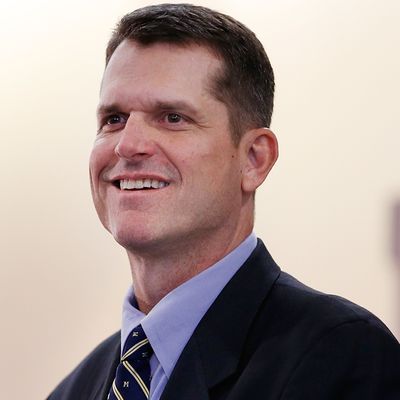
Over the past couple of weeks, a wide array of national sportswriters weighed in on the prospect that Jim Harbaugh would accept a job as football coach at the University of Michigan. They universally dismissed the notion, often ridiculing it as preposterous. This conclusion followed naturally from their assumption that college football is merely a business, and a minor-league business at that. And so for a coach to spurn the highest level of that business for a miniature version would make as much sense as turning down major-league baseball to remain in AAA.
Harbaugh turned down the NFL to coach at his alma mater. He didn’t do it for the money: Harbaugh was the hottest coaching commodity in the league, and NFL franchises waved considerably larger sums than what he signed for at Michigan, but he accepted the Michigan job before a bidding war could even commence. He did it because there is a culture of college sports in the United States that, unfathomable though it may be to those outside it, has important meaning to those within it.
Jim Harbaugh was the star quarterback at Michigan when I was 12, 13, and 14 years old, which gave him a special and affixed role in the firmament of a teenage mind. The figure who held that role in Harbaugh’s own mind was Rick Leach. When Harbaugh was 12, Leach was Michigan’s star quarterback, and Harbaugh the ballboy, and his father an assistant coach. Here is a ten-second clip of Leach scoring a touchdown in 1977, after which young Jim Harbaugh scurries onto the field to bask in his glory.
That Harbaugh went on to play for Michigan is itself a cinematic tale. He followed his father into coaching, where he experienced a series of wild successes at the University of San Diego, Stanford, and the San Francisco 49ers. Ten years ago, near the outset of his coaching career, Harbaugh attended a reunion celebrating 125 years of Michigan football history, where he explained what the experience meant to him:
From Michigan’s standpoint, Harbaugh’s hire is a massive coup, perhaps, ex ante, the best hire any college football team has ever made. It is also a romantic and natural homecoming. This morning, Leach wept with joy on an Ann Arbor radio station.
From Harbaugh’s standpoint, if you think of college football as nothing more than a business, it is an act of professional irrationality. The only possible way to make sense of his choice is to consider the possibility that he actually believes what he said in 2004: that he believes he did not merely provide free labor in return for skill development but belonged to a community; that this community stands in his mind for something larger than the self-interest of its component parts; that all this talk about turning boys into men is not just hokum.






























